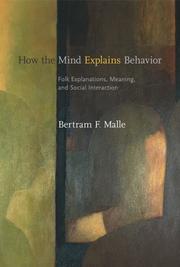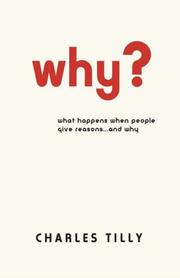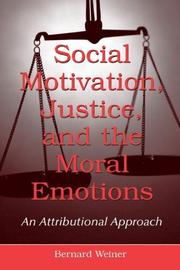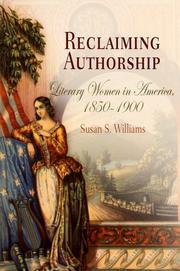| Listing 1 - 6 of 6 |
Sort by
|

ISBN: 0262633396 9780262633390 0262134454 0262278936 9780262278935 9780262134453 1417574372 9781417574377 Year: 2006 Publisher: Cambridge, Mass. MIT
Abstract | Keywords | Export | Availability | Bookmark
 Loading...
Loading...Choose an application
- Reference Manager
- EndNote
- RefWorks (Direct export to RefWorks)
Psycholinguistics --- Social psychology --- Attribution (Social psychology) --- Cognition --- Gestalt psychology --- Social perception --- Interaction sociale --- Représentation sociale --- Attribution
Book
ISBN: 2100495577 9782100495573 Year: 2006 Publisher: Paris : Dunod,
Abstract | Keywords | Export | Availability | Bookmark
 Loading...
Loading...Choose an application
- Reference Manager
- EndNote
- RefWorks (Direct export to RefWorks)

ISBN: 1282964909 1400837782 9786612964909 9781400837786 069112521X 9780691125213 9780691136486 0691136483 9781282964907 6612964901 069112521X 9780691125213 Year: 2006 Publisher: Princeton : Princeton University Press,
Abstract | Keywords | Export | Availability | Bookmark
 Loading...
Loading...Choose an application
- Reference Manager
- EndNote
- RefWorks (Direct export to RefWorks)
Why? is a book about the explanations we give and how we give them--a fascinating look at the way the reasons we offer every day are dictated by, and help constitute, social relationships. Written in an easy-to-read style by distinguished social historian Charles Tilly, the book explores the manner in which people claim, establish, negotiate, repair, rework, or terminate relations with others through the reasons they give. Tilly examines a number of different types of reason giving. For example, he shows how an air traffic controller would explain the near miss of two aircraft in several different ways, depending upon the intended audience: for an acquaintance at a cocktail party, he might shrug it off by saying "This happens all the time," or offer a chatty, colloquial rendition of what transpired; for a colleague at work, he would venture a longer, more technical explanation, and for a formal report for his division head he would provide an exhaustive, detailed account. Tilly demonstrates that reasons fall into four different categories: Convention: "I'm sorry I spilled my coffee; I'm such a klutz." Narratives: "My friend betrayed me because she was jealous of my sister." Technical cause-effect accounts: "A short circuit in the ignition system caused the engine rotors to fail." Codes or workplace jargon: "We can't turn over the records. We're bound by statute 369." Tilly illustrates his topic by showing how a variety of people gave reasons for the 9/11 attacks. He also demonstrates how those who work with one sort of reason frequently convert it into another sort. For example, a doctor might understand an illness using the technical language of biochemistry, but explain it to his patient, who knows nothing of biochemistry, by using conventions and stories. Replete with sparkling anecdotes about everyday social experiences (including the author's own), Why? makes the case for stories as one of the great human inventions.
Reasoning (Psychology) --- Causation. --- Explanation. --- Attribution (Social psychology) --- Thought and thinking --- Causality --- Cause and effect --- Effect and cause --- Final cause --- Beginning --- God --- Metaphysics --- Philosophy --- Necessity (Philosophy) --- Teleology --- Explanation (Philosophy) --- Knowledge, Theory of --- Cognition --- Gestalt psychology --- Social perception --- Social psychology --- Attribution (Social psychology). --- Reasoning (Psychology). --- Logic
Book
ISBN: 3525825498 9783525825495 Year: 2006 Volume: Folge 3, 277 Publisher: Göttingen Vandenhoeck und Ruprecht
Abstract | Keywords | Export | Availability | Bookmark
 Loading...
Loading...Choose an application
- Reference Manager
- EndNote
- RefWorks (Direct export to RefWorks)
Greece --- Korinthia (Greece) --- Grèce --- Corinthie (Grèce) --- History --- Historiography --- Sources --- Histoire --- Historiographie --- Hellenica Oxyrhynchia. --- Sources. --- Historiography. --- Grèce --- Corinthie (Grèce) --- Corinthia (Greece) --- Nomos Korinthias (Greece) --- Argolis kai Korinthia (Greece) --- Greece - History - To 146 B.C. - Historiography --- Korinthia (Greece) - History - Sources. --- Korinthia (Greece) - Historiography. --- Helléniques d'oxyrhynque --- Littérature et histoire --- Attribution --- Antiquité --- 4e siècle av. j.-c.

ISBN: 1135601674 1299623867 1282375482 9786612375484 141061574X 9781410615749 0805855262 9780805855265 0805855270 9780805855272 9781135601676 9781135601621 1135601623 9781135601669 1135601666 Year: 2006 Publisher: Mahwah Erlbaum
Abstract | Keywords | Export | Availability | Bookmark
 Loading...
Loading...Choose an application
- Reference Manager
- EndNote
- RefWorks (Direct export to RefWorks)
Social Motivation, Justice, and the Moral Emotions proposes an attribution theory of interpersonal or social motivation that distinguishes between the role of thinking and feeling in determining action. The place of this theory within the larger fields of motivation and attributional analyses is explored. It features new thoughts concerning social motivation on such topics as help giving, aggression, achievement evaluation, compliance to commit a transgression, as well as new contributions to the understanding of social justice. Included also is material on moral emotions, with discussi
Motivation (Psychology) --- Social justice. --- Emotions. --- Attribution (Social psychology) --- Action, Psychology of --- Drive (Psychology) --- Psychology of action --- Psychology --- Cognition --- Gestalt psychology --- Social perception --- Social psychology --- Feelings --- Human emotions --- Passions --- Affect (Psychology) --- Affective neuroscience --- Apathy --- Pathognomy --- Equality --- Justice --- Social aspects. --- Emotions --- Social justice --- Social aspects

ISBN: 0812239423 9780812239423 1322512787 0812203895 Year: 2006 Publisher: Philadelphia University of Pennsylvania press
Abstract | Keywords | Export | Availability | Bookmark
 Loading...
Loading...Choose an application
- Reference Manager
- EndNote
- RefWorks (Direct export to RefWorks)
There was, in the nineteenth century, a distinction made between "writers" and "authors," Susan S. Williams notes, the former defined as those who composed primarily from mere experience or observation rather than from the unique genius or imagination of the latter. If women were more often cast as writers than authors by the literary establishment, there also emerged in magazines, advice books, fictional accounts, and letters a specific model of female authorship, one that valorized "natural" feminine traits such as observation and emphasis on detail, while also representing the distance between amateur writing and professional authorship. Attending to biographical and cultural contexts and offering fresh readings of literary works, Reclaiming Authorship focuses on the complex ways writers such as Maria S. Cummins, Louisa May Alcott, Elizabeth Keckley, Mary Abigail Dodge, Elizabeth Stuart Phelps, and Constance Fenimore Woolson put this model of female authorship into practice. Williams shows how it sometimes intersected with prevailing notions of male authorship and sometimes diverged from them, and how it is often precisely those moments of divergence when authorship was reclaimed by women. The current trend to examine "women writers" rather than "authors" marks a full rotation of the circle, and "writers" can indeed be the more capacious term, embracing producers of everything from letters and diaries to published books. Yet certain nineteenth-century women made particular efforts to claim the title "author," Williams demonstrates, and we miss something of significance by ignoring their efforts.
Authoring (Authorship) --- Authorship --- Oeuvres -- Attribution --- Paternité artistique --- Paternité littéraire --- Qualité d'auteur --- Schrijverskwaliteit en auteurschap --- Writing (Authorship) --- American literature --- Women and literature --- Literature --- English literature --- Agrarians (Group of writers) --- Women authors&delete& --- History and criticism --- History --- Women authors --- 19th century --- United States --- Cummins, Maria Susanna --- Alcott, Louisa May --- Criticism and interpretation --- Hawthorne, Nathaniel --- Keckley, Elizabeth --- Woolson, Constance Fenimore --- James, Henry --- Authorship. --- History and criticism. --- Cultural Studies. --- Literature.
| Listing 1 - 6 of 6 |
Sort by
|

 Search
Search Feedback
Feedback About UniCat
About UniCat  Help
Help News
News